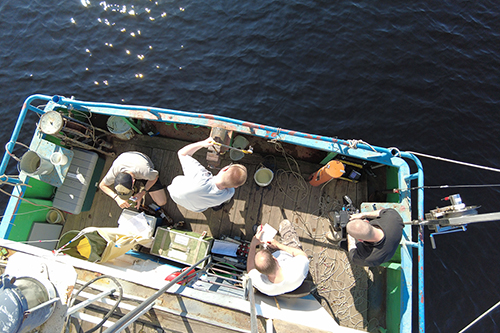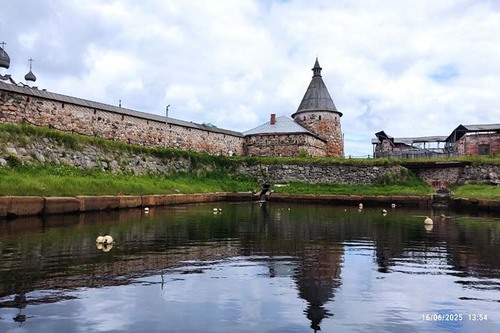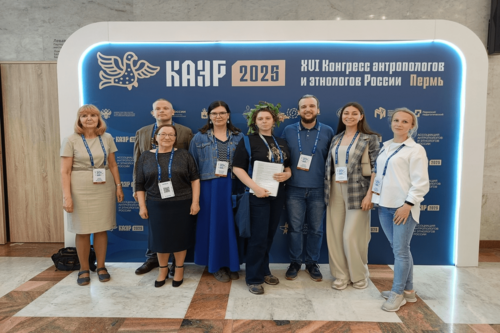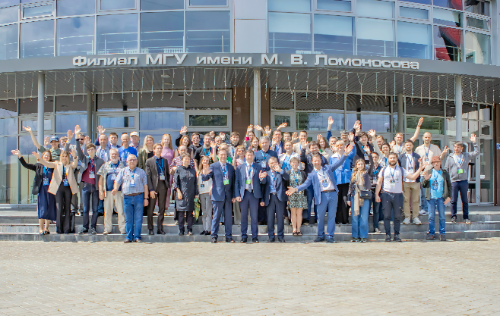How can a DNA molecule be isolated from a banana in a home experiment? Eighth-graders from Secondary General Education School No. 3 learned about it at a class in the Genetics Laboratory of the Institute of Biology KarRC RAS. The class was facilitated by Researcher Marina Zaretskaya and Research Trainee Daniil Atorin.
During the theoretical part of the class the children were reminded about the structure of DNA molecule and told about its role in biological processes, about what mutations can happen and what consequences they can have, what diseases they lead to.
In plants and animals, the DNA molecule is located in the cell nucleus. To “extract” DNA, a special solution must be prepared that destroys cell walls and nuclear membranes. As it turned out, this can be done with reagents you can find in any kitchen: table salt, baking soda and a dishwashing detergent.
Salt and soda are needed to prepare a solution with a certain stable concentration of hydrogen ions. It is supplemented with a detergent, a substance that reduces the surface tension of water for its better penetration into pores and between fibers. A dishwashing liquid can be used as a detergent. When added to the buffer solution, it destroys the cell membranes so that DNA strands float freely.
Mashed banana was mixed with the resulting solution and placed in a thermostat for 15 minutes at 60 degrees. At home, it is recommended to use a water bath. Next, filter paper or gauze can be used to filter out the destroyed cell walls. In the laboratory, a centrifuge is used for this purpose. White DNA strands visible to the eye in a test tube can be obtained after the precipitation process, which happens when ethyl alcohol is added.
— We chose this career-guidance tour to broaden our horizons on the subjects of biology and chemistry. We ran diagnostic tests at school, which revealed poor knowledge of natural science disciplines. In eighth grade children are just starting to learn chemistry and have had no experience with labware. It's curious to get acquainted with the work of the Genetics Laboratory, to see how the scientific equipment looks like. I think it was great practical experience and the class was beneficial! - shared Yana Sabantseva, tutor of the “Ticket to the Future” project at School No. 3, English teacher.
Classes under the “Ticket to the Future” project at KarRC RAS will continue until November 23. Participating in this project, schoolchildren can learn, first-hand, about the work of an analytical chemist, chemical analysis laboratory technician, geologist-mineralogist, and archaeologist. The group size is limited, pre-registration is required.
News

October 17, 2024
A new area for classes within the “Ticket to the Future” project was presented at KarRC RAS
Classes within the federal project “Ticket to the Future” started at the Karelian Research Center RAS. Participating in this project, schoolchildren can learn, first-hand, about the work of an analytical chemist, chemical analysis laboratory technician, geologist-mineralogist, and archaeologist. This year scientists present a new area of career guidance: familiarization with the work of a geneticist and molecular biologist. The first to attend a class were 8th grade students of Secondary General Education School No. 3 with Advanced Study of Foreign Languages in Petrozavodsk.
Classes within the federal project “Ticket to the Future” started at the Karelian Research Center RAS. Participating in this project, schoolchildren can learn, first-hand, about the work of an analytical chemist, chemical analysis laboratory technician, geologist-mineralogist, and archaeologist. This year scientists present a new area of career guidance: familiarization with the work of a geneticist and molecular biologist. The first to attend a class were 8th grade students of Secondary General Education School No. 3 with Advanced Study of Foreign Languages in Petrozavodsk.
See also:

July 28, 2025
Researchers monitor the state of Lake Onego under climate change and human impact
Staff of the Northern Water Problems Institute KarRC RAS are back from an expedition that covered larger bays and deep-water regions of Lake Onego. The multidisciplinary studies both provide new data on the wellbeing of the lake ecosystem through modern analysis methods and permit tracing the changes relying on over 60-year-long own observation series. Annual monitoring is especially important for evaluating the combined effect of climate change and human impact on the lake.
Staff of the Northern Water Problems Institute KarRC RAS are back from an expedition that covered larger bays and deep-water regions of Lake Onego. The multidisciplinary studies both provide new data on the wellbeing of the lake ecosystem through modern analysis methods and permit tracing the changes relying on over 60-year-long own observation series. Annual monitoring is especially important for evaluating the combined effect of climate change and human impact on the lake.

July 24, 2025
Karelian scientists assess the consequences of human impact on Solovki ecosystem
In 2025, KarRC RAS scientists continued field surveys in Blagopoluchiia Bay, Solovetsky Archipelago, White Sea. Two expeditions have already taken place – in winter and in summer, and one more is coming in August. Scientists explore the human impact on the archipelago’s nature, both in the bay waters and on adjacent land. They have detected an unusual ice structure, collected sediment cores to assess the pollution level, described the composition of the flora in the intertidal zone and the coastal meadows.
In 2025, KarRC RAS scientists continued field surveys in Blagopoluchiia Bay, Solovetsky Archipelago, White Sea. Two expeditions have already taken place – in winter and in summer, and one more is coming in August. Scientists explore the human impact on the archipelago’s nature, both in the bay waters and on adjacent land. They have detected an unusual ice structure, collected sediment cores to assess the pollution level, described the composition of the flora in the intertidal zone and the coastal meadows.

July 22, 2025
Karelian scientists delivered their research results at the Russian Congress of Anthropologists and Ethnologists
Researchers of the Institute of Linguistics, Literature and History KarRC RAS took part in the Russian Congress of Anthropologists and Ethnologists. The scientists presented the results of their studies on the material culture, calendarian rites, ethno-cultural interactions in Northern Eurasia, cognitive studies of ethnicity, ethno-demographic processes, and other ethnology topics.
Researchers of the Institute of Linguistics, Literature and History KarRC RAS took part in the Russian Congress of Anthropologists and Ethnologists. The scientists presented the results of their studies on the material culture, calendarian rites, ethno-cultural interactions in Northern Eurasia, cognitive studies of ethnicity, ethno-demographic processes, and other ethnology topics.

July 10, 2025
Mathematicians from KarRC RAS shared their expertise in modeling interactions of hydrogen isotopes with structural materials at an event in Sarov
International School “Interaction of Hydrogen Isotopes with Structural Materials” was held at the National Center for Physics and Mathematics in Sarov, Novgorod Region. Karelian scientists gave a lecture and presentations on computational materials science – an efficient tool for rescaling test-sample experimental data to real-life power reactor structures.
International School “Interaction of Hydrogen Isotopes with Structural Materials” was held at the National Center for Physics and Mathematics in Sarov, Novgorod Region. Karelian scientists gave a lecture and presentations on computational materials science – an efficient tool for rescaling test-sample experimental data to real-life power reactor structures.









